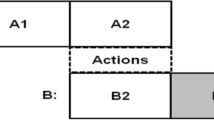Abstract
Recent developments in Nancy Cartwright's philosophy are examined, against the background of her earlier ideas. The examination is structured around two related problems for the interpretation of Cartwright; how to understand Cartwright's claim that we can see capacities in experiments, and the question of whether Cartwright is entitled to call herself an empiricist. It is argued that we should understand Cartwright as allowing that the seeing of capacities in experiments can incorporate an interpretive aspect. It is further argued that, although Cartwright is a long way from contemporary Humean empiricists, her views can be understood as falling within the broad empiricist tradition. In the process of addressing these issues the role of idealization in Cartwright's thought is explained.
Similar content being viewed by others
REFERENCES
Carruthers, P.: 1992, Human Knowledge and Human Nature, Oxford University Press, Oxford.
Cartwright, N.: 1983, How the Laws of Physics Lie, Oxford University Press, Oxford.
Cartwright, N.: 1989, Nature's Capacities and Their Measurement, Oxford University Press, Oxford.
Cartwright, N.: 1992, 'Aristotelian Natures and the Modern Experimental Method', in J. Earman (ed.), Inference, Explanation and Other Frustrations, The University of California Press, Berkeley, 44–71.
Cartwright, N.: 1993, 'Is Natural Science Natural Enough? A Reply to Philip Allport', Synthese 94, 291–301.
Cartwright, N.: 1994, 'Fundamentalism Vs the Patchwork Model of Laws', Proceedings of the Aristotelian Society XCIV, 279–292.
Cartwright, N.: 1995, 'Précis of Nature's Capacities and Their Measurement', Philosophy and Phenomenological Research LV, 153–156.
Chalmers, A.: 1993, 'So the Laws of Physics Needn't Lie', Australasian Journal of Philosophy 71, 196–205.
Chalmers, A.: 1996, 'Cartwright on Fundamental Laws: A Response to Clarke', Australasian Journal of Philosophy 74, 150–2.
Clarke, S.: 1995, 'The Lies Remain the Same: A Reply to Chalmers', Australasian Journal of Philosophy 73, 152–155.
Galilei, G.: 1953, Dialogue Concerning the Two Chief World Systems, Ptolemaic and Copernican. Translated by S. Drake. The University of California Press, Berkeley.
Humphreys, P.: 1995, 'Abstract and Concrete', Philosophy and Phenomenological Research LV, 157–161
Kuhn, T.S.: 1977, 'Mathematical versus Experimental Traditions in the Development of Physical Science', in T.S. Kuhn, The Essential Tension: Selected Studies in Scientific Tradition and Change, The University of Chicago Press, Chicago, 31–65.
Marx, K.: 1968a, Capital Vols. I–III, Progress Publishers, Moscow.
Marx, K.: 1968b, Theories of Surplus Value Vols. I–III, Progress Publishers, Moscow.
McMullin, E.: 1985, 'Galilean Idealization', Studies in the History and Philosophy of Science 16, 247–273.
Nowak, L.: 1980, The Structure of Idealization, Reidel, Dordrecht.
Seeger, R.J.: 1966, Galileo Galilci: His Life and Works, Pergamon Press, Oxford.
van Fraassen, B.C.: 1989, Laws and Symmetry, Oxford University Press, Oxford.
Author information
Authors and Affiliations
Rights and permissions
About this article
Cite this article
Clarke, S. Empiricism, Capacities and Experiments. Science & Education 8, 363–374 (1999). https://doi.org/10.1023/A:1008673505325
Issue Date:
DOI: https://doi.org/10.1023/A:1008673505325




